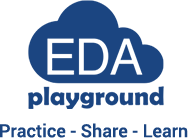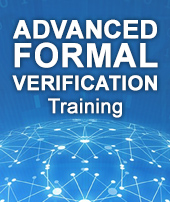Thanks for taking the time to visit Doulos at this year's conference
This page has brought together a range of Doulos courses and FREE webinars and tutorials for you. Enjoy!
If you would like to explore training options with Doulos, check out the listing below and then contact your local Doulos team directly, or complete a webform*.
DVCon US 2025 Paper by Senior Member Technical Staff, Doug Smith:
Lessons Learned Using Formal for Functional Safety
SoC Design and Verification Courses
Live Online Training
Self-Paced Training
Upcoming KnowHow Webinars
The use of non-determinism with formal is how formal is able to manage large state spaces and still arrive at a quick solution. Non-determinism plays a part in writing our formal constraints, formal targets, and formal abstractions.
This webinar will explain what non-determinism is, how it's used, and show lots of examples so you can take advantage of non-determinism to accelerate the verification of your designs.
It is partnered with Synopsys and all of the examples can be used in VC Formal.
Attendance is FREE and live Q&A will be provided throughout the broadcast.
REGISTER NOW FOR THIS FREE KNOWHOW WEBINAR »
Although SystemVerilog is perhaps most widely used in the context of hardware verification, it also contains many features directly relevant to FPGA hardware designers. We explore the features of SystemVerilog that are useful for RTL synthesis using the Vivado™ Design Suite from AMD, showing how the RTL SystemVerilog language constructs have been optimized for productivity and reliability.
We start from the basic principles of RTL coding style in SystemVerilog, then focus on the language features that allow FPGA hardware designers to work very efficiently while at the same time avoiding synthesis pitfalls.
Content Summary:
- Introduction
- SystemVerilog in the Vivado Design Suite
- Modules, ports, parameters, and hierarchy
- Combinational and clocked logic
- Assignments and procedures
- Control constructs and operators
- Hardware-oriented data types including packages
- Interfaces and Modports
REGISTER NOW FOR THIS FREE KNOWHOW WEBINAR »
Check out the latest live webinar schedule »
KnowHow Webinars On-Demand and Tutorials
Is formal verification ready for general use or do you need a PhD to use it? Larger companies continue to recruit formal PhDs into their verification teams while other less-well-qualified engineers seem reluctant to go beyond simplified formal "apps".
So, what is the truth of the matter? Can non-specialist engineers become productive with formal?
In this webinar Doulos Co-Founder and Technical Fellow, John Aynsley will explore the strengths and weaknesses of formal verification.
Using the VC Formal™ tool from Synopsys® as an example, John will explain exactly what you need to know to use formal effectively without acquiring deep knowledge of how it works under-the-hood.
REGISTER & VIEW THIS WEBINAR NOW »
Formal verification is known to work well in areas like control logic, interface protocols, and so on, but it is often dismissed for use on data paths since capacity becomes a significant issue. In particular, packet based protocols have potentially very large state spaces, which can pose a problem for formal. However, in this paper, a step by step process is presented, showing how to decompose a frame of data into simple formal constraints, modeling code, and assertions, which allows formal to fully explore the entire packet state space.
VIEW THIS TUTORIAL ON THE DOULOS WEBSITE NOW »
An advantage of using formal verification is how quickly a formal environment can be created with a few simple properties that immediately start finding design issues. However, not all design behaviors are easily modeled using SystemVerilog's property syntax, resulting in complex or numerous properties, or behaviors that require more than just SVA. That is where helper code comes to the rescue. Helper code can significantly reduce the complexity of properties as well as be used to constrain formal analysis. Likewise, formal analysis may need to reduce the complexity of the problem and state space, which helper code can also help. So where are some places to use helper code and when?
This article looks at how helper code can be used to simplify our properties, model formal abstractions, constrain formal inputs, and aid formal analysis.
VIEW THIS ARTICLE ON THE DOULOS WEBSITE NOW »
In this paper, eight common asynchronous scenarios are presented and SVA solutions for checking them. In addition, an alternative approach using a global fast clock is presented as both a portable simulation solution and something that works for both formal verification and emulation. Lastly, incorporating functional coverage into the asynchronous checking is also discussed.
VIEW THIS PAPER ON THE DOULOS WEBSITE NOW »
This webinar will explore the most common mistakes users of SystemVerilog make. These mistakes have been identified by observing the lab work of students participating in Doulos training classes. The webinar aims to help you avoid the pitfalls and, in the process, get your designs working faster.
Doulos CTI Brian Jensen, will explore the topics listed below and provide useful tips and resources to help you. Practical examples will be provided using QuestaSim from Siemens-EDA in the online simulation environment EDA Playground. The webinar will include live interactive Q&A participation for attendees with Doulos technical experts.
Topics include:
- Wire vs Variable Assignments
- Static vs Automatic Variables
- Static vs Automatic Tasks
- Assignments in Tasks – Pass-by-Copy
- Assignments in Tasks – Pass-by
- Reference
- Enumerations
- struct and packed struct
- Equality Operators
- Equality between vectors
- SVA Temporal Behavior
REGISTER & VIEW THIS WEBINAR NOW »
Doulos Co-Founder & Technical Fellow John Aynsley teaches the core principles necessary to understand and use SystemVerilog Assertions, focussing on the aspects of SVA that are applicable to both formal verification and simulation.
Particular emphasis is on the core semantics of temporal logic so that you will be able to write your own assertions, understand what you are doing, and avoid the many pitfalls that trap beginners.
SVA is really not hard if you approach it properly!
REGISTER & VIEW THIS WEBINAR NOW »
This webinar explores debugging SystemC code with basic tools, including issues and strategies to make improvements. A large portion of the webinar includes a demonstration of a small design. Topics include single-stepping without getting lost and obtaining information about SystemC simulation status. The session concludes with ideas on how to simplify debugging and accelerate development.
The webinar is suitable for SystemC programmers of any level. It will cover:
- SystemC debug challenges
- Tools
- Demo:
- Configuring the code
- .gdbinit
- Strategies & Wrap-up
The webinar also features the Virtualizer Studio IDE from Synopsysfor browsing, editing and debug of SystemC source code.
The webinar is presented by David C Black, Doulos Senior Member of Technical Staff and co-author of "SystemC: From the Ground Up".
REGISTER & VIEW THIS WEBINAR NOW »
View all on-demand webinars available »
About Doulos Training
For over 30 years, Doulos has been dedicated to developing the skills, capability and productivity of engineers designing the latest technologies.
The essential choice for independent training to over 5,400 companies spanning 84 countries, Doulos provides scheduled classes and bespoke team training both In-Person and Live Online. The course portfolio includes hardware design and verification languages and methodologies, embedded software, AI and deep learning.
Our business ethos is 'Service through Excellence' which, when combined with our industry-leading KnowHow™, makes Doulos the ideal training partner.
Contact Doulos now »





